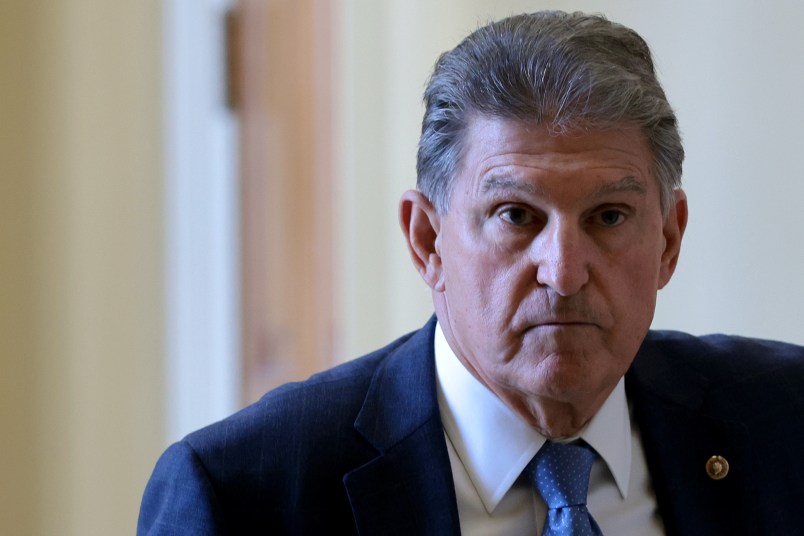Some House and Senate Democrats are considering a new carbon tax after Sen. Joe Manchin (D-WV) shot down the crux of Democrats’ climate plan in the reconciliation bill, according to the New York Times.
Earlier this month, the Washington Post reported that Manchin told White House aides that he can’t support the Clean Electricity Performance Program (CEPP). A source told the Post that Manchin “doesn’t see a formulation that could get past his concerns with regard to rewarding utilities for behavior they’re already taking.” The CEPP proposes rewarding utilities that halt burning fossil fuels and pivot to wind, solar and nuclear energy. Those who don’t comply would be penalized.
Democrats have since reportedly considered other alternatives to water down the policy in an effort to get Manchin to come around to it.
Senate Finance Committee chair Ron Wyden (D-OR) sees Manchin’s rejection of CEPP as an opportunity to push a carbon tax.
“I’ve had a carbon pricing bill in my desk for the last three years just waiting for the time,” Wyden told the Times on Saturday. “What has been striking is the number of senators who’ve come to me about this since early fall — after Louisiana got clobbered with storms, the East Coast flooding, the Bootleg wildfires here in my own state. Now there are a number of senators, key moderate senators, who’ve said they’re open to this. And a lot of House folks who have said they would support it if the Senate sends it over.”
Wyden’s staff, which its drafting the carbon tax language, is reportedly weighing a domestic carbon tax that could start at $15 to $18 per ton and would increase over time. It would be directly applied to coal mining companies, large natural gas processing plants and oil refiners, based on the the amount of emissions associated with their products. The only exception would be oil refiners not getting charged for gasoline, and instead being likely charged for producing diesel fuel and petrochemicals, in an effort to shield most American drivers at gas stations.
Wyden told the Times that revenue from the carbon tax policy would be used for tax rebates or checks for poor and working-class Americans — specifically for those employed in the fossil fuel industry.
“You’ve got to show workers and families, when there’s an economy in transition, that they will get their money back,” Wyden told the Times. “They will be made whole.”
A carbon tax could prove to be a politically divisive move, however, as the country experiences rising inflation and energy prices. The tax also wouldn’t guarantee that companies would stop polluting, and environmental justice advocates have argued that it could disproportionately harm low-income communities.
Manchin, who comes from the coal-rich state of West Virginia and is a key vote in the evenly divided Senate, also signaled late last month that he is not a fan of a carbon tax.
“I just heard about that,” Manchin told reporters last month when asked about the new push for the carbon tax, according to The Hill. “Any type of a tax is going to be passed on to the people. Now if a tax is going to be beneficial to help something and give us more research and development and innovation and technology, it’s something to look at.”
Following Manchin stating his opposition to the CEPP to the White House, the Biden administration has been working on rewriting the legislation and coming up with alternatives to replace CEPP.
According to the Times, some alternatives under consideration at the White House include a voluntary version of a cap-and-trade program, which would create a market for polluters to buy and sell allowances for a certain amount of emissions, as well as adding to the $300 billion in clean energy tax incentives and credits that remain in the reconciliation bill. The White House is reportedly also looking for ways to save some parts of the CEPP.
On Saturday, a White House official told the Times that staff members are continuing to hold discussions with members of Congress and that there is no agreement yet on a final version of climate provisions.
Democrats’ consideration of a suite of options as alternatives to the CEPP come as centrist senators Manchin and Kyrsten Sinema (D-AZ) hold up progress on the reconciliation package amid their complaints over its $3.5 trillion price tag. President Biden and Democratic leadership have come around to accepting the reality that centrist senators will likely force the reconciliation package’s price tag down in the neighborhood of $2 trillion.
Last week, CNN reported that Manchin told some Democrats on a call that he has issued with the expansion of Medicare to cover vision, hearing and dental, opposes paid family leave and medical leave proposals, rejects climate measures that would halve emissions by 2030 and is concerned about tuition-free community college. Sinema is reportedly opposed to tax increases on corporations and the wealthy, dismissing one of Democrats’ plans to pay for the bill.







People can defend Manchin as much as they want but he is no Democrat. Every single time we make progress he comes out with something else he ‘just can’t support’. He’s a moderate Republican. Period.
It’s perverse to call these two prostitutes “centrist” isn’t it? they are the height of immorality.
Aren’t we screwed? I mean one pivotal Democratic Senator makes $500k/yr from a coal brokerage business and the other one can’t overcome an urge to put on costumes and run away and join the circus.
I’m going to steal this. Sums Sinema up perfectly.
You can’t tell me that a huge chunk of his constituents will NOT have “issues” with his stance.